'If We Give Up Our Land, We'll Become Slaves'
Farmers protest Karnataka government and big business land bid;

The year was 2007. The Maharashtra state government had decided to give 30,000 acres of farmland to Mukesh Ambani's Reliance Industries for building a Special Economic Zone in the Raigarh district. Forty-five villages were going to be uprooted. The All India Kisan Sabha and other organisations got together and organised huge rallies of nearly 70,000 farmers outside the Divisional Commissioner's office. They said there was no question of giving up any land.
They worked to create awareness in all 45 villages and tell the farmers that once their land was taken, they would be left with nothing. The little they would get as compensation would be over in a year or two. Then they would be forced to live on the streets. The people were convinced, and the government was forced to hold a referendum on one question: 'Are you willing to give your land for the Mahamumbai SEZ?'
In a historic moment, more than 95 per cent farmers replied 'no' to giving up their land. The SEZ had to be denotified. Never before in India had such a big struggle led to success. Even today those 45 villages remain standing.
Forward to the present day, in Devanahalli taluk of the Bengaluru Rural district. It has been 87 days. Famers from 13 villages have been protesting day and night to save their lands, hoping to see a repeat of the 2007 struggle's outcome.
They are demonstrating against the Karnataka Industrial Areas Development Board's recently proposed acquisition of 1,777 acres of land for the second phase of the Haraluru Industrial Area. It was just last year that the KIADB acquired 1,300 acres in the same area. If they go ahead with the plan, more than 350 families would be left without any land.
While the KIADB and the state government maintain that these projects will create employment and lead to development, prominent farmers associations like the AIKS argue that this is an eyewash. According to Kisan Sabha president Ashok Dhawale,
"The area is located close to the international aiport. In 2001, about 1,000 acres were acquired from the farmers for the airport. Since it was for the airport, the farmers agreed and they received some compensation. But once the airport came up, all the other real estate sharks wanted land in and around the area. However, as they cannot say that, they started talking about industries, development and employment or else they wouldn't be able to sell the idea.
"Then in 2016, they took another 1,500 acres for a Special Economic Zone, which is meant to be for industries. They even managed to convince the farmers again. But only 300 out of the 1,500 acres actually ended up being utilised for industries. 700 acres are still lying vacant. The land has been taken, but it's not utilised for building industries. Now the suspicion is that that 700 acres may be being used for real estate as it's near the airport."
The farmers have now started building resistance. "They have realised that their land is being taken, but nothing is being done with it. At least if industries came up, people who have been displaced, their family members can get a job over there," Dhawale explained.
The 1,777 acres earmarked for the alleged project is highly fertile land. Farmers here have been practising horticulture, grape farming, vegetable farming, silkworm rearing and dairy farming for decades. "If the land goes, all these businesses would be finished. Whatever income they get from this will be stopped," said Dhawale.
Taking a cue from previous successful struggles, the famers now plan to intensify their protests. Mukund, one of the farmers who lost more than half his land in the first phase of acquisition is now fighting to keep the little he has. "I have been growing grapes, mangoes, chickoo, vegetables and also running a poultry farm for more than 50 years, since my grandfather's time. I will fight for my land as long as I can."
"The compensation doesn't really help. In fact, we don't even get the entire promised compensation. We'll have to keep chasing officials for it, and in the process lose money to agents and others. Even if the industries do come up, we'll be given menial jobs like cleaning toilets," Mukund told The Citizen.
"Now we are owners, but if we give up our land, we'll end up becoming slaves."

